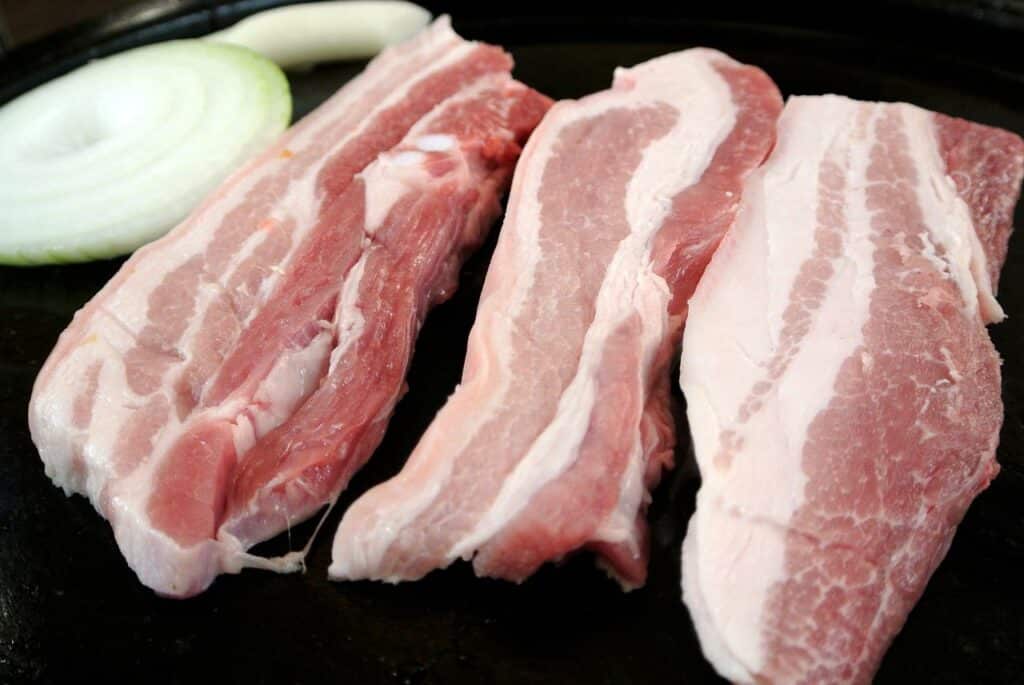The savory aroma of a slow-roasted crispy pork belly wafting through your kitchen brings to mind the juicy, hearty, and delicious taste you are about to enjoy.
You, however, wonder if the mouth-watering crispy pork belly is safe for your dog.
So, can dogs eat pork belly?
No.
Your dog shouldn’t eat pork belly due to its high salt content.
Too much salt can cause your dog sodium poisoning and other gastrointestinal issues.
Dogs are largely carnivores, but before you give your canine that chunk of pork belly to chew on, here are a few things to consider.

Reasons why pork belly is not good for dogs
Undercooked or raw pork belly presents various health issues that could put your pup at serious risk.
Let’s delve into why you should avoid pork belly in your dog’s diet.
Undercooked pork belly may contain parasites
Raw or undercooked pork belly may have trichinella spiralis larvae, a parasite that causes trichinosis infection.
This parasite causes major health problems to dogs when ingested; your dog is likely to experience muscle inflammation and damage to the brain, nerves, and heart.
Stomach pain, diarrhea, stomach upset, and vomiting are other signs that your canine may have due to Trichinella parasites.
The meat must be thoroughly cooked to kill these parasites and make the pork belly safe for consumption.
Pork belly contains high salt content
Sodium is a requirement to boost healthy cell functions in dogs.
Excessive salt can lead to sodium poisoning.
Sodium poisoning can cause electrolyte imbalance and dehydration in dogs.
Lethargy, a dry mouth, and sunken eyes are signs of dehydration in your canine.
You can detect high saline levels through symptoms like tremors, vomiting, weakness, and seizures.
Pork belly may have seasoning
Some elements used to make pork tastier are harmful to dogs and shouldn’t be in their diet.
Some condiments, spices, and sauces like mustard, onions, chili, and garlic, are potentially toxic and can cause gastric distress in dogs.
Processed and cured varieties of pork belly like sausages, bacon, and ham contain high fat and sodium levels, too much for your canine’s stomach.
Pork belly has soft bones
A dog’s favorite pastime is chewing on bones.
However, pork belly bones are a health risk as they are small and fragile.
They also soften when cooked as the heat weakens their structure.
The bones pose a great threat as they are likely to splinter and injure your furry friend’s tongue, gums, or digestive system.
Raw pork belly bones may not splinter as easily but are an easy channel for transmitting harmful parasites and bacteria.
Bones are also a choking hazard and can cause blockage of the small intestines in puppies.
Pork belly is fatty
Pork belly is extremely fatty, which poses a problem to your furry buddy.
The heavy layer of fat, even when cooked, is difficult to digest.
The fat leads to gastric issues that cause pancreatitis.
Symptoms are loss of appetite, dehydration, vomiting, and diarrhea.

Health problems
Feeding your canine pork belly, especially when undercooked or raw, heightens the risk of infection brought on by parasites and bacteria.
Thus, the emphasis is on thoroughly cooking the pork belly before your canine can indulge.
Larvae from the Trichinella parasite commonly found in raw or uncooked pork belly can cause your furry friend damage to the nerves, brain, and heart, and further cause muscle inflammation.
Excessive salt and highly fatty foods are not ideal for your canine.
The high salt content can cause your pet sodium poisoning, while the fat can promote obesity leading to heart issues, high blood pressure, and stroke.
Another critical condition that can be brought by too much fat on the pork belly is pancreatitis, a life-threatening pancreas infection in dogs.
There is also the risk of gum, tongue, and intestinal lacerations from the bones, which soften after cooking and splinter, causing the damage.
Symptoms to look out for when your dog ingests pork belly
You will know your fur buddy is unwell when you see the following signs.
- Vomiting: Vomit is a clear sign that your dog is unwell. Vomiting is a sign of diseases caused by parasites. The high salt and fat content is another trigger.
- Diarrhea: Parasites and high fat and sodium contents are major causes of diarrhea in dogs.
- Lethargy- The high-fat content is guaranteed to cause lethargy in dogs. The unhealthy weight gain predisposes your canine to obesity, heart problems, and high blood pressure, leading to fatigue.
- Bloating and gas- Excessive salt in the pork belly causes your canine a gassy, bloated stomach that causes great discomfort.
- Dehydration: Too much salt in the pork belly causes dehydration indicated by sunken eyes, dry skin, and mouth.
- Bloody tongue and gums: Seen as lacerations in your dog’s mouth caused by bone splinters that have cut and injured the tongue, gums, and intestines.
If you have fed your dog, or suspect that he has ingested pork belly, check out for these symptoms. Many stomach issues can be eased using broth soup, pureed pumpkin, and ice cubes. However, if the symptoms persist, don’t hesitate to contact your vet.
Safer options for your dog other than pork belly
- Beef- This is an excellent source of protein and can be roasted, baked, or boiled.
- Chicken, turkey, or duck- The chicken broth is a great solution to soothe your pet’s upset stomach. These birds are a good source of protein, and are a healthy choice.
- Tuna, shrimp, and salmon- are good protein and omega fatty acid sources. Always debone the fish.
- Vegetables- Spinach, kale, broccoli, carrots, cucumber, and pumpkins are all excellent sources of vitamins and minerals.
- Fruits- Cored apples, strawberries, and melons are great fruit choices and a great treat for your dog. Avoid grapes as dogs are deathly allergic.
How to make pork belly safer and palatable for dogs?
When you eliminate the risk factors in pork belly, your dog can safely enjoy a bite or two.
There are ways to make pork safe for your fur buddy to enjoy.
Pork is a healthy source of protein, vitamins, and minerals.
Final thoughts
Pork belly in its raw, fatty form is dangerous to your dog.
Luckily, there are ways to make the delicacy safer and healthier for your canine.
Lean pork belly is an occasional treat when all safety measures are implemented.
However, it is advisable to stick to more wholesome and safer meals.
- What Dog Breeds Have Pink Skin? - March 24, 2023
- What Are the Most Inspiring Dog Breeding Quotes? - March 20, 2023
- Can Pheromone Spray Help Improve Dog Breeding Results? - March 19, 2023








